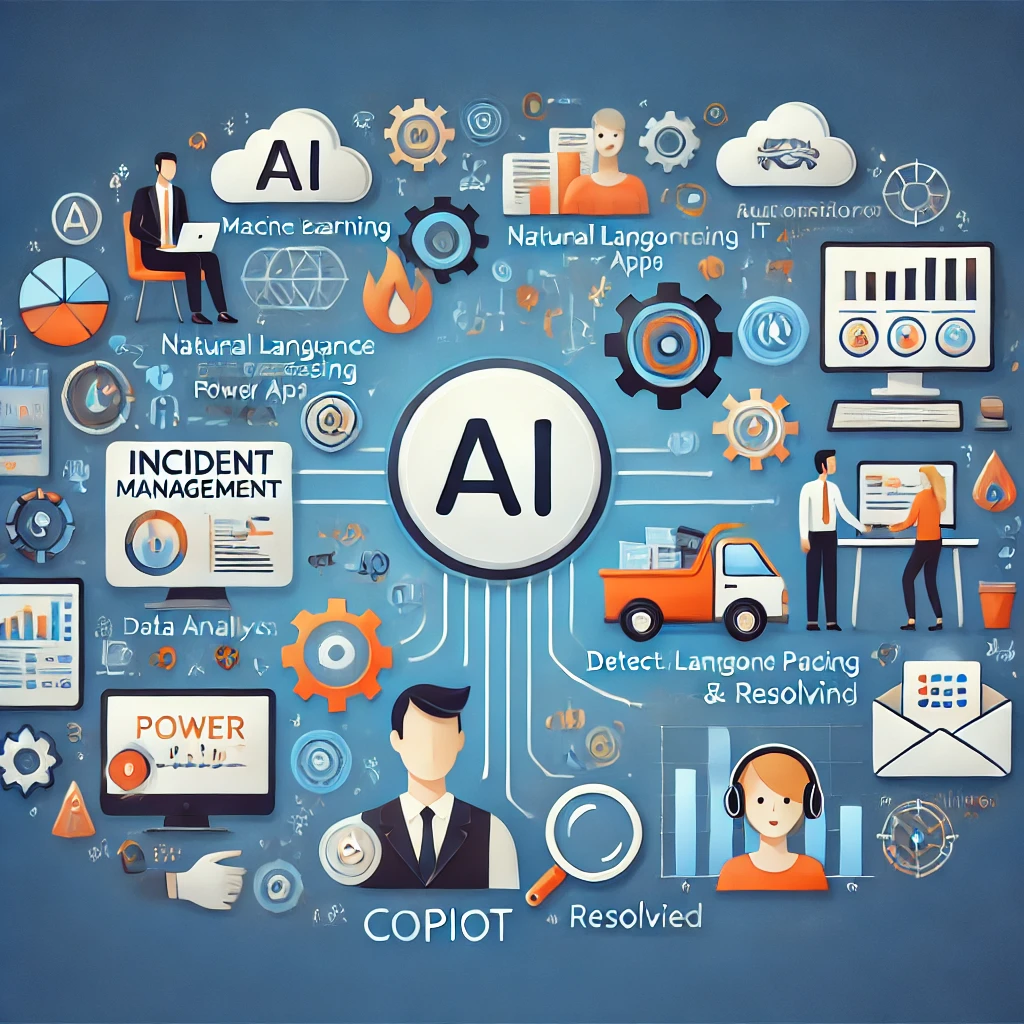Incident Management in Power Apps:
Incident management is a critical aspect of IT service management (ITSM) that ensures the swift resolution of incidents to maintain smooth business operations. Traditional incident management processes often involve manual detection, reporting, and resolution, which can be time-consuming and error-prone. However, the advent of Artificial Intelligence (AI) is revolutionizing these processes, especially within Microsoft Power Apps. This article explores how AI is transforming incident management, focusing on AI features like Copilot and natural language processing (NLP) that enhance incident detection, reporting, and resolution.
The Role of AI in Incident Management
Incident Detection
AI enhances incident detection by utilizing machine learning algorithms to monitor systems and predict potential issues before they escalate into significant problems. This proactive approach ensures that incidents are identified and addressed swiftly, minimizing downtime and improving service reliability.
Example:
- Predictive Maintenance: AI algorithms analyze historical data to predict potential system failures, allowing IT teams to address issues proactively.
Incident Reporting
Traditional incident reporting methods often rely on manual entry, which can be slow and prone to errors. AI streamlines this process by automating data collection and using NLP to understand and categorize incidents reported by users in natural language.
Example:
- Natural Language Processing (NLP): Users can describe incidents in their own words, and AI-powered tools interpret and categorize these reports accurately, speeding up the reporting process.
Incident Resolution
AI accelerates incident resolution by providing IT teams with intelligent insights and recommendations based on historical data and patterns. AI tools can also automate routine tasks, freeing up IT personnel to focus on more complex issues.
Example:
- Automated Workflows: AI-driven automation tools can handle routine incident management tasks, such as ticket assignment and status updates, reducing the workload on IT staff.
AI Features in Power Apps
Copilot for Makers and Users
Copilot is an AI-powered assistant in Power Apps that leverages natural language processing to assist both app makers and users. It helps in building and modifying apps quickly and enables users to interact with the app using natural language queries.
Features:
- Natural Language Processing: Allows users to query data and navigate the app using everyday language.
- App Building Assistance: Helps makers create and modify apps efficiently by providing AI-driven suggestions and automating repetitive tasks.
Integrating AI into Incident Management
Power Apps integrates AI capabilities to enhance incident management processes, ensuring more efficient and accurate handling of incidents.
Steps to Integrate AI:
- Set Up AI Builder: Use AI Builder to create and train AI models tailored to your incident management needs.
- Implement AI Models: Integrate these models into your Power Apps to automate detection, reporting, and resolution processes.
- Utilize Power Automate: Combine AI capabilities with Power Automate to create automated workflows that streamline incident management tasks.
Benefits of AI in Incident Management
- Improved Accuracy: AI reduces human errors in incident detection and reporting, ensuring more accurate and reliable data.
- Faster Response Times: Automation and intelligent insights provided by AI enable quicker incident resolution, minimizing downtime.
- Enhanced User Experience: Natural language processing allows users to report incidents effortlessly, improving their overall experience.
- Proactive Issue Management: Predictive analytics help identify potential issues before they escalate, allowing for proactive management.
Conclusion
AI is undeniably transforming incident management in Power Apps by enhancing detection, reporting, and resolution processes. Features like Copilot and natural language processing empower both app makers and users, making incident management more efficient and effective. As AI technology continues to evolve, its integration into incident management systems will only become more sophisticated, driving further improvements in IT service management.



